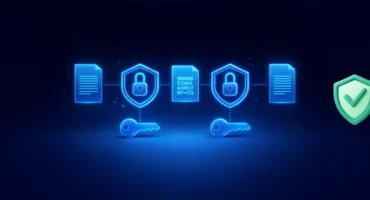Is eBay Safe? How to Avoid Getting Scammed On The Marketplace
Yes, eBay is a safe marketplace to use. But even when you don’t have doubts about whether eBay is safe, it doesn’t mean you should relax. Various scams appear from time to time, so you have to be careful all the time. For that reason, we’ve prepared a list of useful tips that will help you stay safe when you buy and sell items on eBay. Let’s start without any further ado!
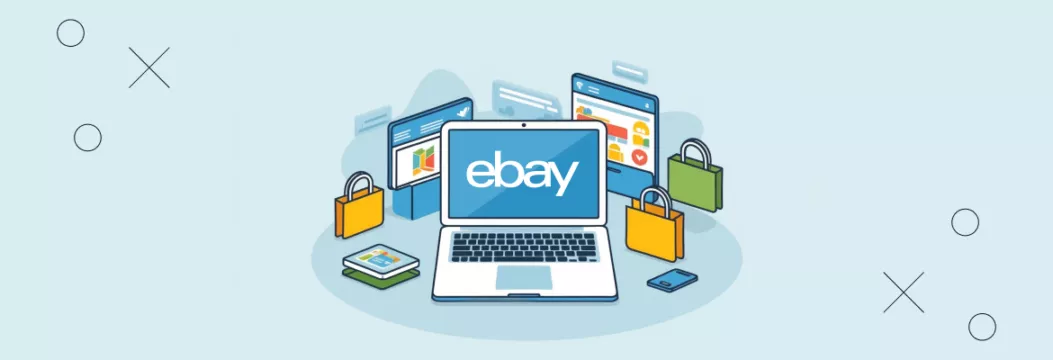
eBay safety measures
The platform uses a wide range of security measures to protect your personal information:
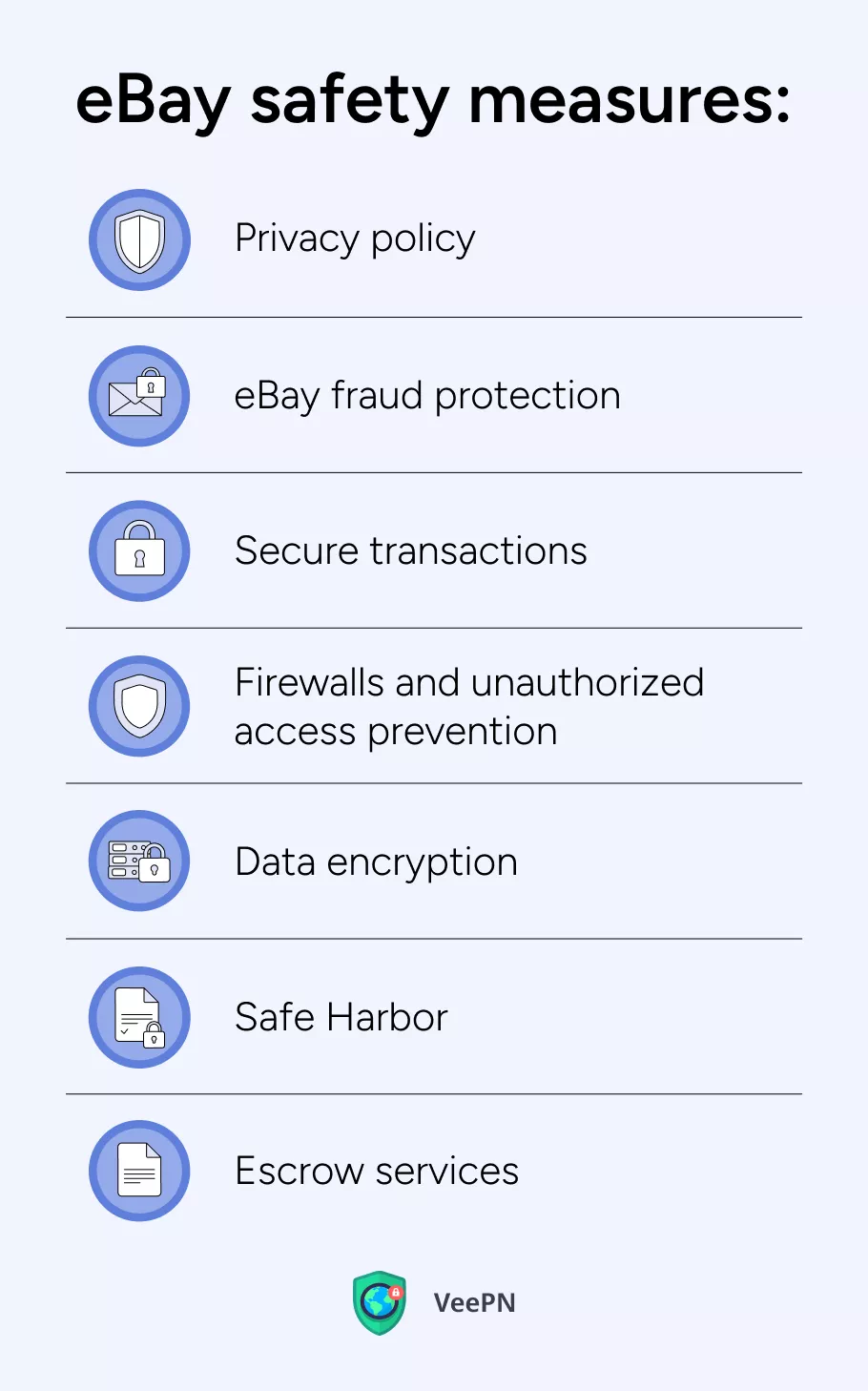
- Privacy policy. eBay has an in-depth privacy policy that clearly explains all the nuances of user data collection and security measures the company must take for protecting users’ information from leaking and unauthorized access. In such a way, you can be sure that eBay takes a legal responsibility to do their best to prevent your data from getting into wrong hands.
- eBay fraud protection. The platform offers buyers the right to request a refund for damaged, undelivered, or wrongly described products, while sellers can report about abusive buyer behavior and other security threats. As a result, all eBay users can be sure they won’t be left alone with their problems and can get adequate guidance and support.
- Secure transactions. The marketplace follows the Level 1 certification according to Payment Card Industry Data Security Standards (PCI DSS). This means the platform doesn’t disclose any of users financial data and allows only legitimate payment methods such as bank transactions or PayPal transfers to ensure eBay payment security.
- Firewalls and unauthorized access prevention. eBay uses firewalls and access control tools to keep your account locked down from unauthorized logins. But here’s the deal — security starts with you! Make sure to use a strong password and update it regularly to stay protected.
- Data encryption. To make your data unreadable for hackers even if it’s intercepted, the platform uses 128-bit encryption, which makes decoding your personal information challenging. However, it’s not the top-standard encryption method, which means hackers still have chances to decipher your personal information.
- Safe Harbor. eBay’s Safe Harbor program is your go-to guide for staying safe while buying and selling. It offers tips, scam alerts, and a way to report suspicious activity.
- Escrow services for big transactions. Buying something pricey? eBay’s escrow service holds your payment until you confirm you’ve received the item in the condition promised. This protects you from scams and ensures sellers don’t get paid until the deal is legit.
But even with these security measures, eBay isn’t scam-proof. Up next, we’re breaking down the most common eBay scams so you know what to watch for and how to stay safe.
The most common eBay scams
Scammers target both buyers and sellers, which is why we’ve divided the most common eBay frauds into two respective categories:
Buyer-targeted scams
Buyers often fall victims to such scams on eBay:
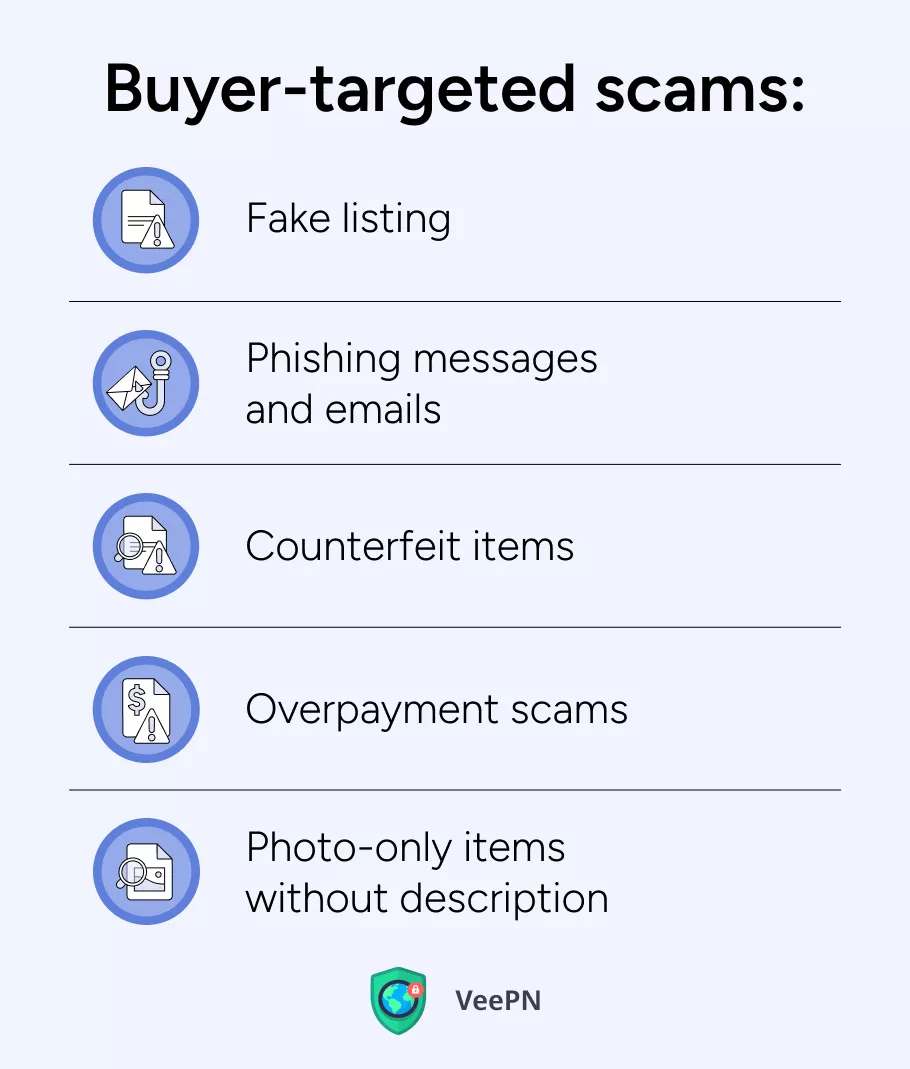
- Fake listing. Such a listing just says you can buy a particular item, but once you pay money, you get nothing in return.
- Phishing messages and emails. You receive a fraudulent email that looks like it’s from eBay, trying to trick you into revealing personal information or downloading malware.
- Counterfeit items. A listing offers you an original and new product, and you pay a full price but get a counterfeit or damaged item.
- Overpayment scams. In an overpayment scam, a buyer sends you more money than the agreed-upon amount for an item. They then ask you to return the excess funds through a less secure method, such as a gift card or wire transfer. Once you send the excess funds, the original payment is often reversed, leaving you out of pocket.
- Photo-only items without description. An item listing includes just a photo (which is often of poor quality) without any description. When you pay for the product, you get a wrong/low quality product or nothing at all.
Seller-targeted scams
If you’re selling something on eBay, scammers may target you with:
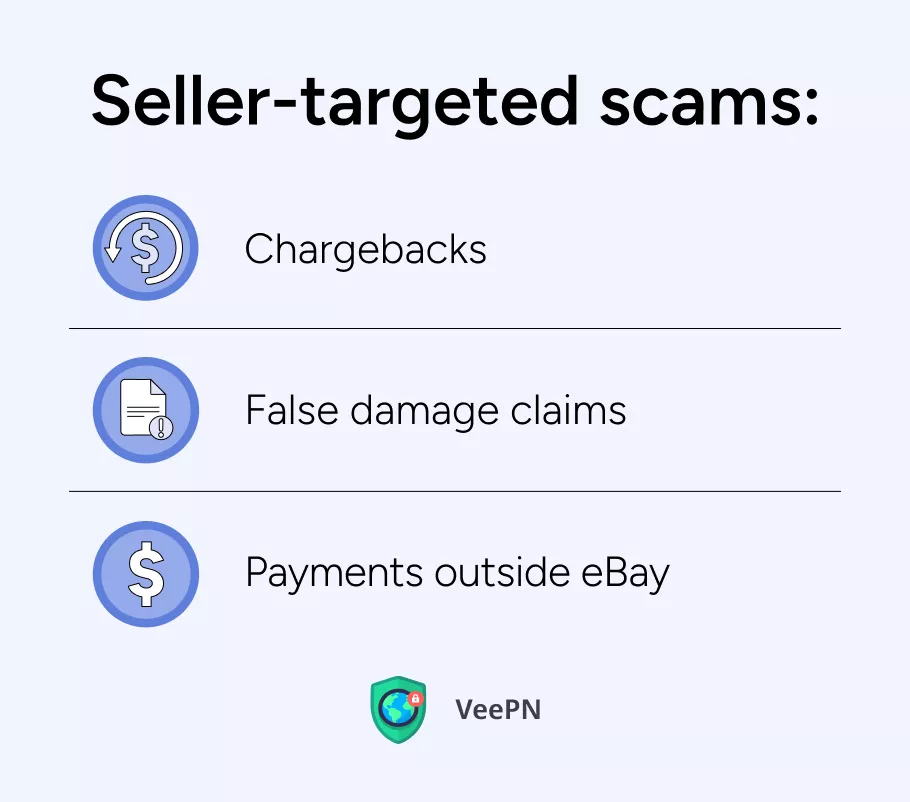
If you’re selling something on eBay, scammers may target you with:
- Chargebacks. The buyer receives the item, then claims it was never received or damaged and requests a chargeback from their payment provider.
- False damage claims. Your scammer-buyer may request a refund for a damaged item when it’s actually not, and provide fake evidence to get money back.
- Payments outside eBay. When you agree to accept the payment that is not supported by eBay, you’re risking losing money as a scammer may be able to revert the transaction via this odd payment method or link you to a fake website infected with malware.
These are the most common scam strategies on eBay you should be aware of. To recognize them before you fall into any of these traps, you need to pay attention to relatable red flags that we’re going to discuss next.
How to spot a scam on eBay
Since scam schemes differ for buyers and sellers, it makes sense to divide scam signs into similar categories:
For buyers:
When you’re buying a product on eBay beware of the following:
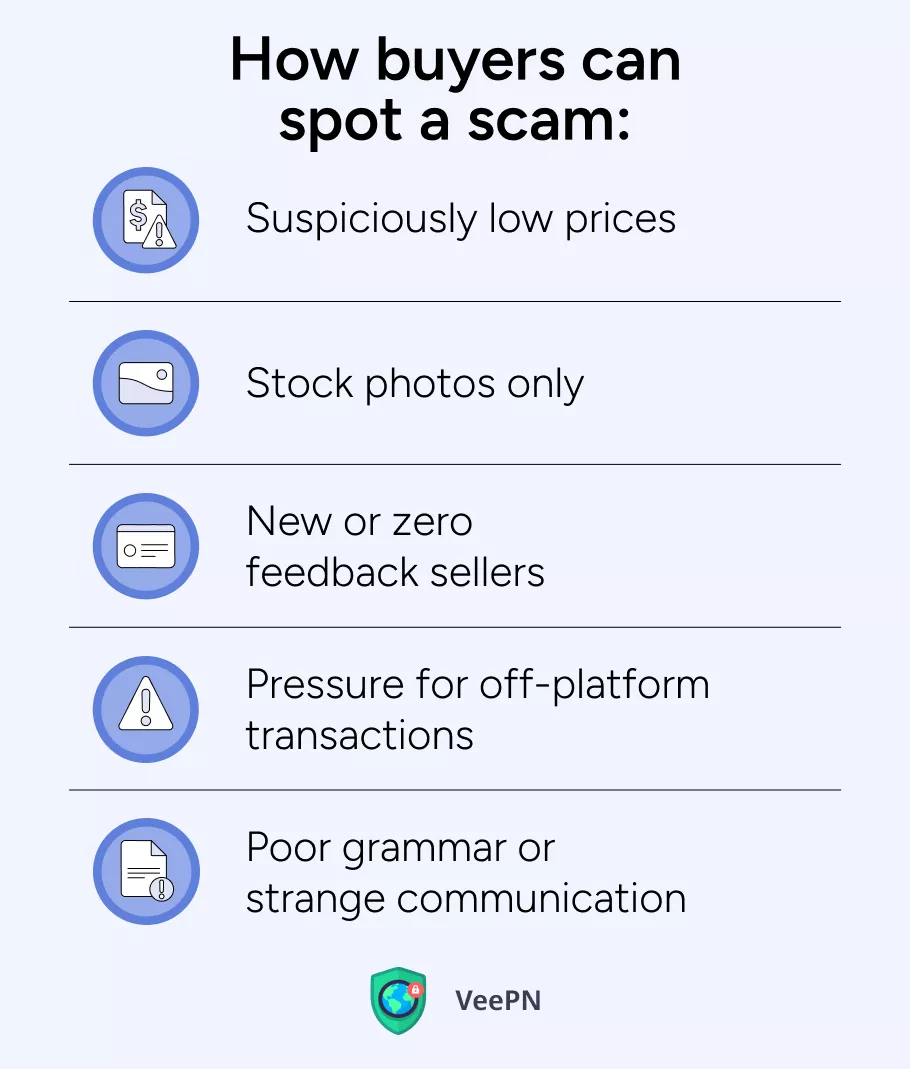
- Suspiciously low prices: If a listing offers a high-value item for much less than its market price, it could be a scam. Check the seller’s feedback score and reviews.
- Stock photos only: In case the seller only uses stock photos instead of real images of the item, they might not actually have it.
- New or zero feedback sellers: Be cautious with sellers who have little or no feedback, especially if they’re selling high-value items. they may have created a new account to scam unsuspecting buyers.
- Pressure for off-platform transactions: Some scammers will try to lure buyers off eBay to avoid eBay buyer protection.
- Poor grammar or strange communication: Odd language, bad grammar, or broken sentences can indicate a scammer. Be careful if the seller avoids directly answering questions about the item.
For sellers:
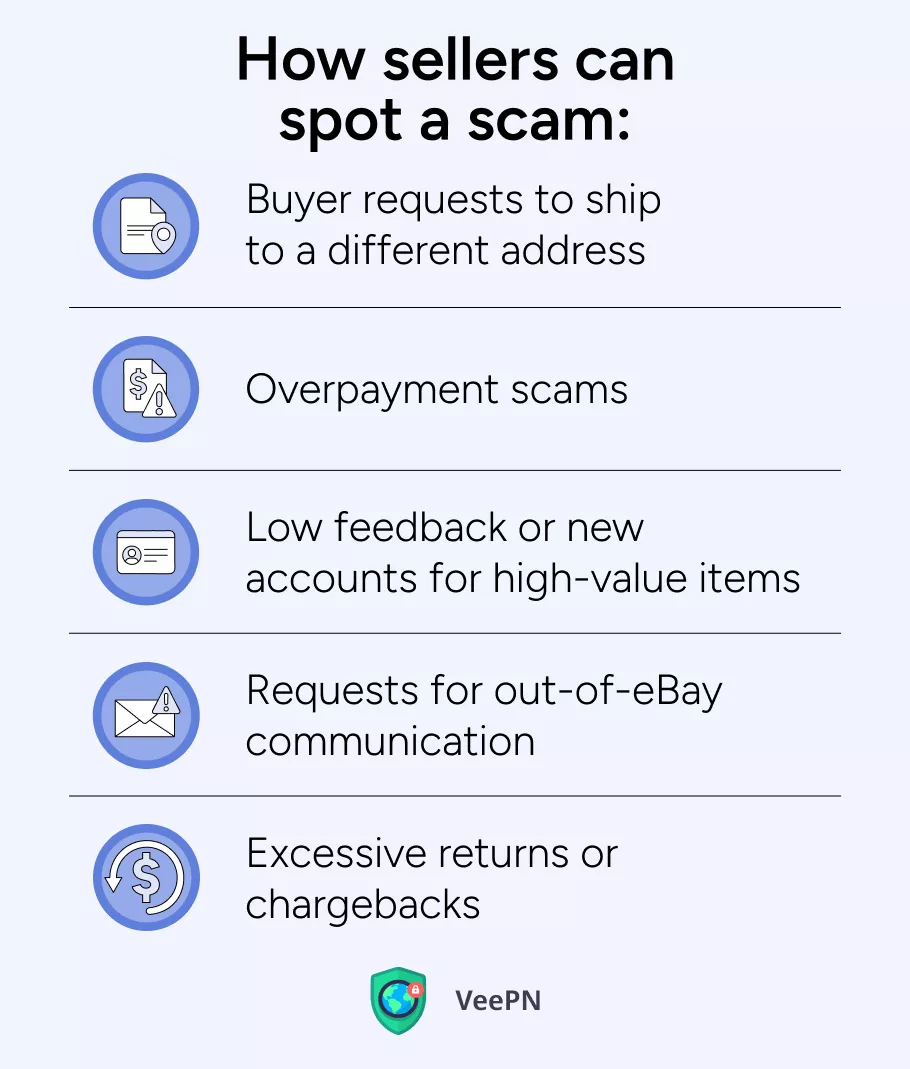
- Buyer requests to ship to a different address: If a buyer asks you to ship to a different address than what’s listed on their eBay account, it is a sign of fraudulent request.
- Overpayment scams: Scammers may “accidentally” pay more than the listing price, asking you to refund the difference.
- Low feedback or new accounts for high-value items: If a new account purchases a high-value item and immediately asks for special treatment, such as expedited or even free shipping, consider delaying shipment until their payment is verified as this could be a scam sign.
- Requests for out-of-eBay communication: Similar to buyers, sellers should be wary of buyers who push for off-platform communication or alternative payment methods.
- Excessive returns or chargebacks: Frequent attempts to return items or file claims after receiving an item can indicate a buyer attempting to exploit eBay’s policies.
Key steps to stay safe on eBay
Being able to spot a scam is undoubtedly a good skill, but avoiding a fraud as such is crucial. Here’s useful eBay safety tips that will surely come in handy:
Before buying
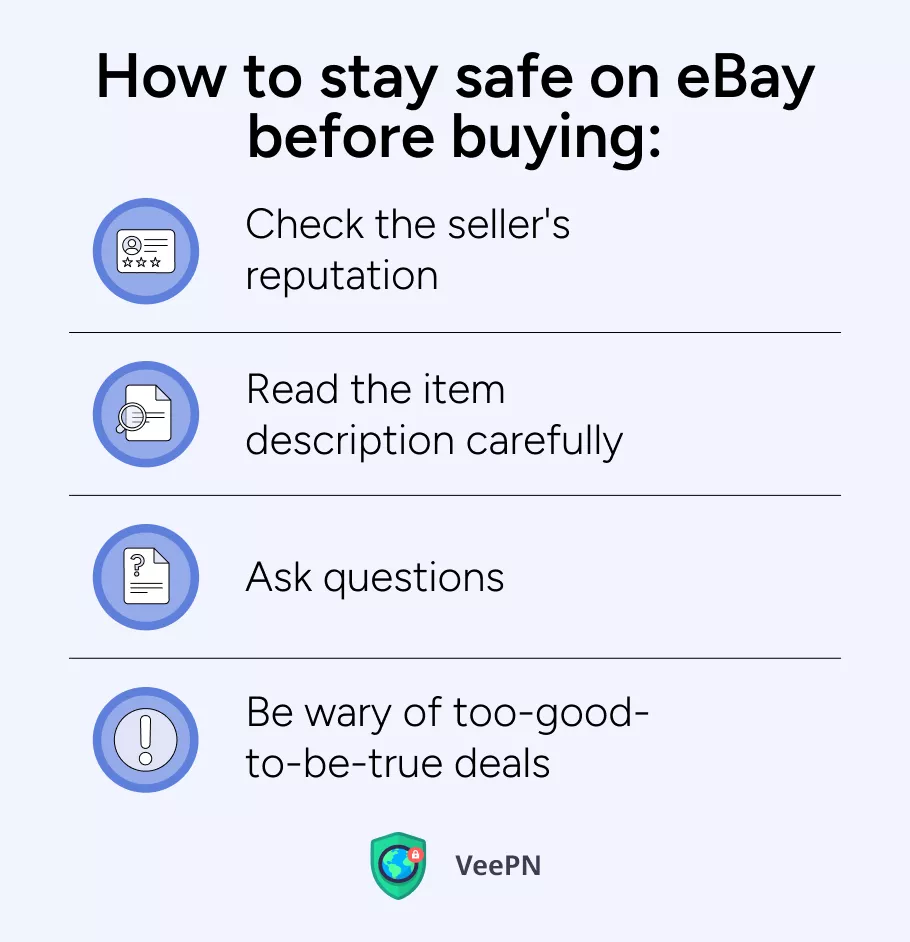
- Check the seller’s reputation. Look at the seller’s feedback rating and reviews. A high rating and positive feedback indicate a reliable seller.
- Read the item description carefully. Pay close attention to the item’s condition, any defects, and shipping terms.
- Ask questions. Don’t hesitate to ask the seller any questions you may have about the item.
- Be wary of too-good-to-be-true deals. If a deal seems suspiciously low, it might be a scam.
Before selling
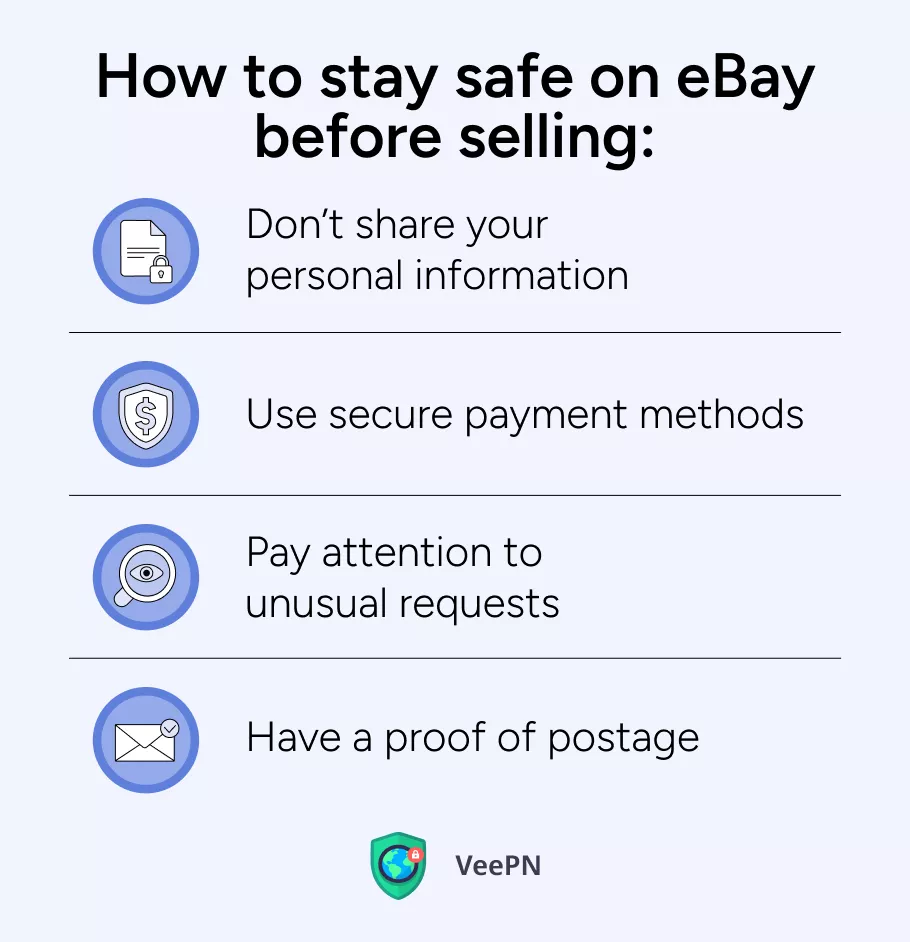
- Don’t share your personal information. Avoid sharing personal information like your home address or phone number with buyers.
- Use secure payment methods. This ensures you receive payment and protects you from chargebacks.
- Pay attention to unusual requests. Be cautious of requests to ship to addresses other than the one provided or to use payment methods outside of eBay’s system.
- Have a proof of postage. Keep a record of your shipping information and proof of postage.
During the transaction
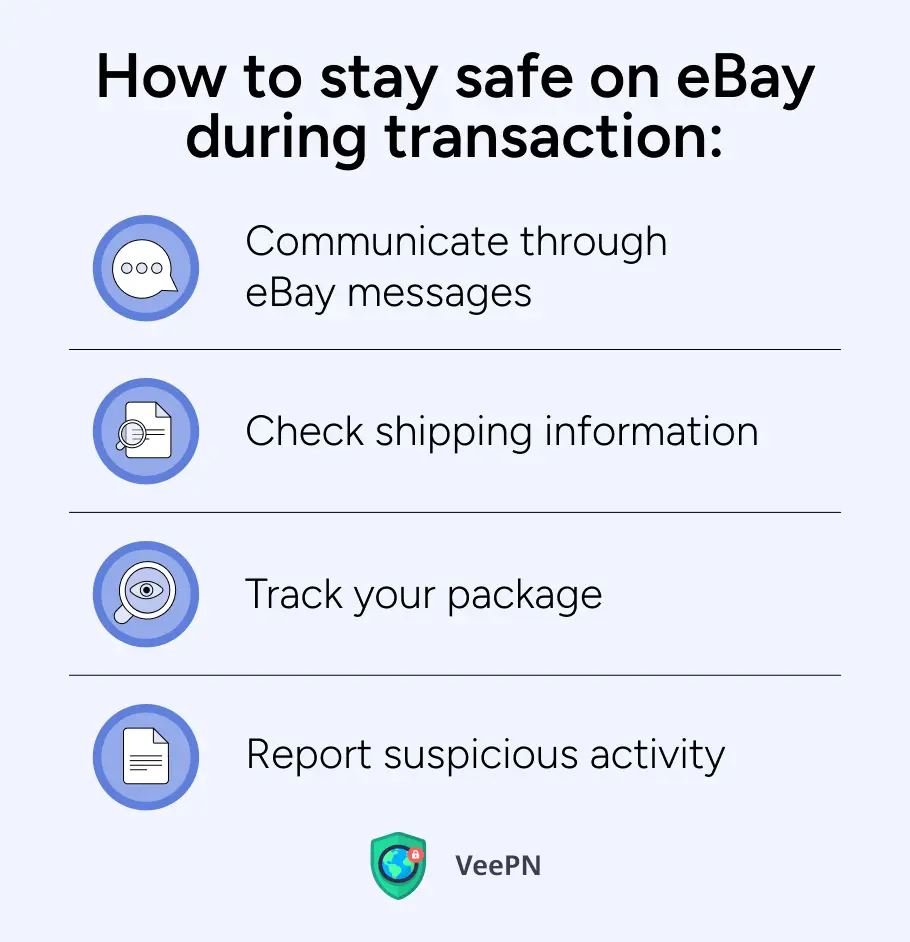
- Communicate through eBay messages. Use eBay’s messaging system to communicate with the seller. Avoid sharing personal information like phone numbers or email addresses and don’t communicate outside eBay.
- Check shipping information. Ensure the shipping address provided by the seller is accurate and matches the item description.
- Track your package. Use the tracking number provided by the seller to monitor your package’s progress.
- Report suspicious activity. If you encounter any suspicious behavior, report it to eBay immediately.
After receiving your item
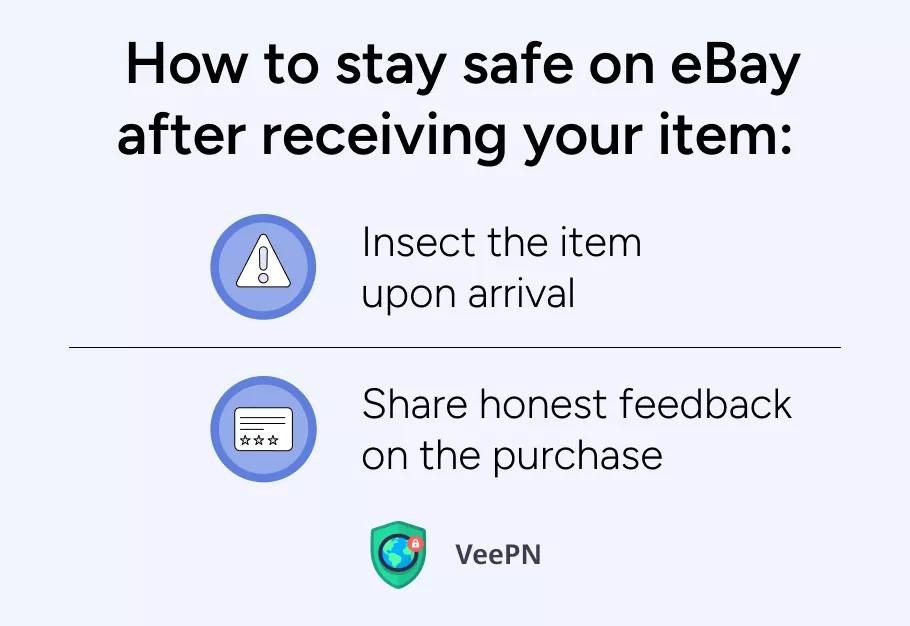
- Insect the item upon arrival. Check the item for any damage or discrepancies.
- Share honest feedback on the purchase. Provide feedback on your experience with the seller to help other buyers.
Other important tips
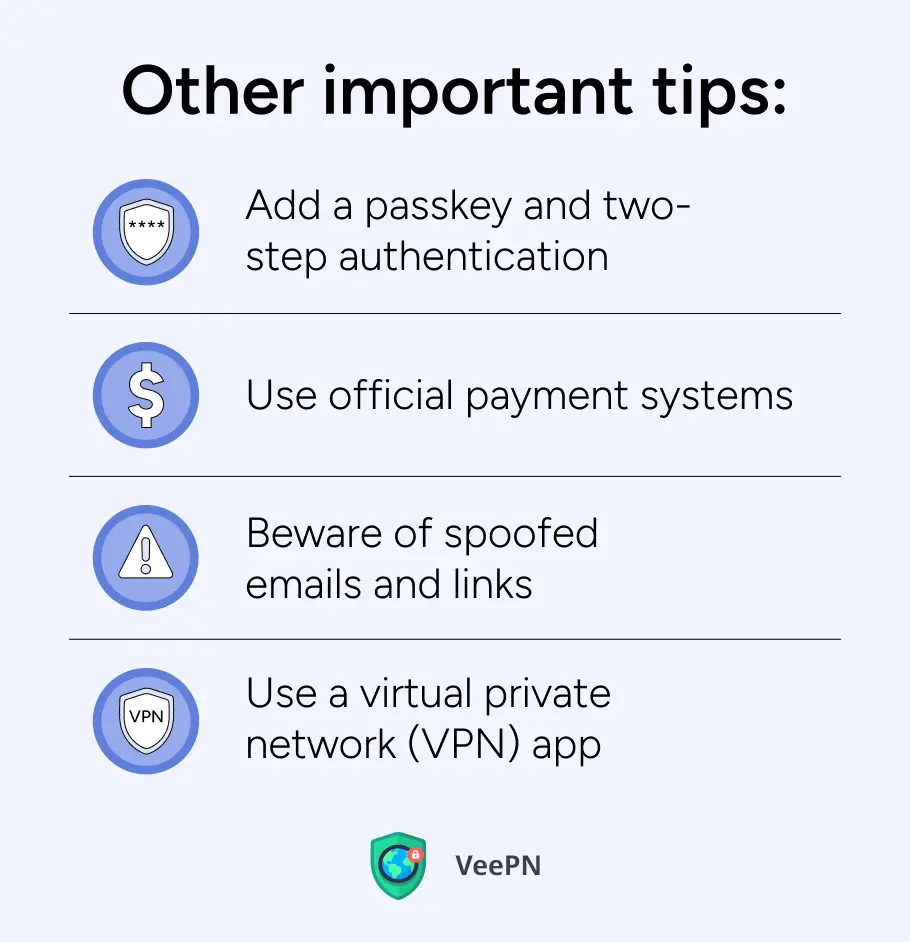
- Add a passkey and two-step authentication. Add an extra layer of security to your eBay account by making it harder to access with passkey and two-step authentication.
- Use official payment systems. Use only those payment methods that are supported by eBay. Never agree to accept or send payment with methods other than approved by the marketplace.
- Beware of spoofed emails and links. Pay attention to the email addresses and links. They may look like legitimate ones but with a difference in one symbol which means you see a spoofed email/link that will leak your personal information or install malware on your device.
- Use a virtual private network (VPN) app. A VPN app encrypts all your Internet traffic and passes it through a secure “tunnel” to a remote server, so that you can conceal your identity online without any fear that scammers can read your personal information and detect your location with an IP address. However, we recommend using premium VPN apps such as VeePN. Unlike free VPNs, VeePN offers high connection speeds and follows a strict No Logs policy.
All security tips are quite explainable, but why is using VeePN so essential?
Reasons for using VeePN to enhance your eBay security
With VeePN, you can significantly improve your online security and use eBay with confidence, as our app offers a range of robust security features:
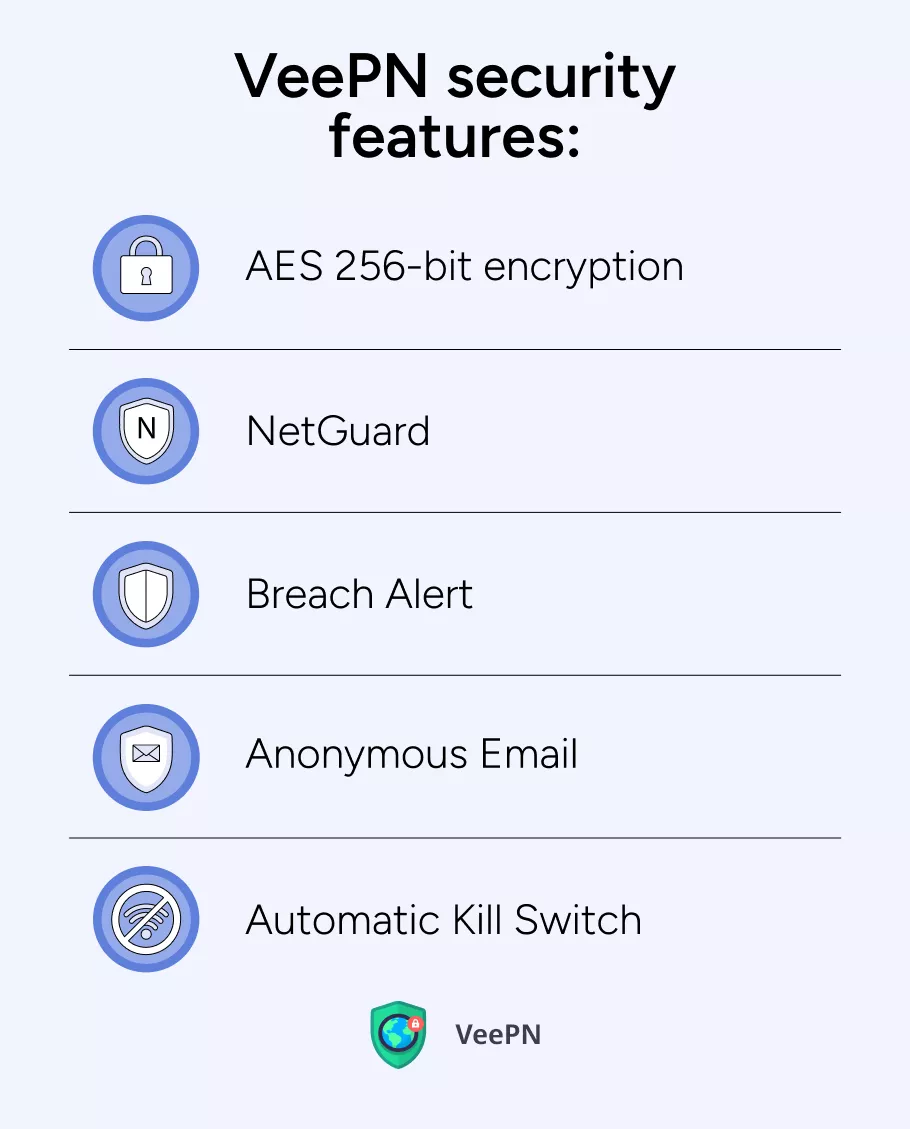
- AES-256 encryption. It’s the most reliable encryption standard so far which ensures hackers won’t be able to read a single symbol of your personal information even if they manage to intercept your Internet traffic. Actually, this encryption standard is much more reliable and secure than one used by eBay.
- NetGuard. This feature protects you from malware and pop-up ads you may face if you happen to click on a phishing link sent to you via eBay messages. NetGuard simply blocks access to your device, so it cannot do any harm.
- Breach Alert. In case your personal information, including eBay credentials, leaks, this mini-app will notify you about this, and you’ll be able to take immediate action.
- Anonymous Email. You may not want to show your real email address but still need to mention one when you register on eBay. Anonymous Email lets you create a fake address for public display, while all the messages will be forwarded to your real email.
- Automatic Kill Switch. If you’re using public WiFi, this feature is a total lifesaver. These networks are wide open, meaning hackers and snoops are always lurking, ready to snatch your sensitive info. VeePN keeps your data locked down, but if the connection ever drops, you could be exposed again—so staying protected is key.
VeePN is compatible with all major operating systems and platforms, so you can use one subscription for up to 10 devices. Download VeePN right now and enjoy a 30-day money-back guarantee!
FAQ
Absolutely — as long as you’re careful. Stick with highly rated sellers, read reviews and product descriptions, and use secure payment methods like PayPal. Plus, eBay’s buyer protection policies have your back if something goes wrong.
Yep! eBay secures transactions, so your credit card info stays protected. For extra safety, using PayPal adds an additional security layer. And as always, keep an eye on your statements for any sketchy activity.
Easy—buy from trusted sellers, check ratings and feedback, and read product descriptions carefully to avoid surprises. Always use secure payment methods (like PayPal or eBay’s system) and never take deals off-platform — that’s a huge red flag. Wanna stay scam-proof? Check out this article for more tips!
Look for high feedback scores, detailed product descriptions, and consistent positive reviews. Legit sellers keep it clear and professional—no vague claims or shady details. If something feels off, trust your gut and move on!
VeePN is freedom
Download VeePN Client for All Platforms
Enjoy a smooth VPN experience anywhere, anytime. No matter the device you have — phone or laptop, tablet or router — VeePN’s next-gen data protection and ultra-fast speeds will cover all of them.
Download for PC Download for Mac IOS and Android App
IOS and Android App
Want secure browsing while reading this?
See the difference for yourself - Try VeePN PRO for 3-days for $1, no risk, no pressure.
Start My $1 TrialThen VeePN PRO 1-year plan




